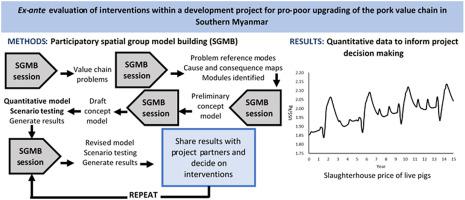Agricultural Systems ( IF 6.1 ) Pub Date : 2021-09-01 , DOI: 10.1016/j.agsy.2021.103265 Jared Berends 1, 2 , Karl M. Rich 3, 4 , Simeon Kaitibie 1 , Michael C. Lyne 1, 5

|
CONTEXT
Myanmar has made rapid economic progress since the country began its transition to a more integrated market economy in the late 2000s. Although these gains are led by positive developments in the agricultural sector, agricultural productivity and profitability are among the lowest in Asia with high rates of poverty especially in rural areas. Small-scale farms dominate rural livelihoods in Myanmar, especially for the 87% of Myanmar's poor who live in rural areas. Hence, these small-scale farms are critical development leverage points as they are an important source of rural incomes to both farm and non-farm households.
OBJECTIVE
This study is part of a larger, five-year agricultural research and development project intended to upgrade pork and rice value chains and strengthen rural livelihoods in southern Myanmar's Tanintharyi Region. We evaluated producer-focused interventions to upgrade the pork value chain using tools that consider the dynamic and complex nature of the chain.
METHODS
This research used systems thinking and participatory methods to develop a system dynamics model of the pork value chain in southern Myanmar. The model integrated modules of animal production, marketing, investment, finance, and collective action. Scenario analysis with the model guided recommendations for pro-poor interventions for implementation within the five-year development project.
RESULTS AND CONCLUSIONS
Simulation results indicated that a mix of technical interventions implemented by functional producer groups showed promise in delivering sustained financial benefits to the target community and outperformed the short-term gains generated by these interventions in the absence of collective action. The model also highlighted specific interventions, such as improved financial services, animal health workers, and training that enabled poorer households to benefit from pig livelihoods while reducing risks from environmental and economic shocks. Within complex agri-food systems such as the pork value chain in Tanintharyi, a multi-pronged intervention strategy is recommended to address problems faced by small-scale agribusiness value chain participants.
SIGNIFICANCE
Development interventions tend to be implemented in complex environments, often with scarce data to inform decision-making. This research shows how system dynamics tools and spatial group model building processes could help overcome these inherent challenges by creating virtual laboratories where plausible project interventions can be tested and modified, bringing increased confidence to implementation choices.
中文翻译:

对缅甸南部猪肉价值链升级干预措施的事前评估
语境
自 2000 年代后期开始向更加一体化的市场经济过渡以来,缅甸取得了快速的经济进步。尽管这些收益是由农业部门的积极发展带动的,但农业生产率和盈利能力在亚洲处于最低水平,贫困率很高,尤其是在农村地区。小型农场主导着缅甸的农村生计,特别是对于生活在农村地区的 87% 的缅甸穷人而言。因此,这些小型农场是关键的发展杠杆点,因为它们是农业和非农家庭的农村收入的重要来源。
客观的
这项研究是一项更大的、为期五年的农业研发项目的一部分,旨在升级缅甸南部 Tanintharyi 地区的猪肉和大米价值链并加强农村生计。我们评估了以生产者为中心的干预措施,以使用考虑链的动态和复杂性质的工具来升级猪肉价值链。
方法
本研究使用系统思维和参与式方法来开发缅甸南部猪肉价值链的系统动力学模型。该模型集成了动物生产、营销、投资、金融和集体行动的模块。该模型的情景分析指导了在五年发展项目内实施的扶贫干预建议。
结果和结论
模拟结果表明,由功能性生产者团体实施的混合技术干预显示出为目标社区提供持续经济利益的前景,并且在缺乏集体行动的情况下优于这些干预措施产生的短期收益。该模型还强调了具体的干预措施,例如改善金融服务、动物卫生工作者和培训,使贫困家庭能够从养猪生计中受益,同时降低环境和经济冲击的风险。在 Tanintharyi 的猪肉价值链等复杂的农业食品系统中,建议采用多管齐下的干预策略来解决小型农业企业价值链参与者面临的问题。
意义
发展干预往往在复杂的环境中实施,往往缺乏数据来为决策提供信息。这项研究展示了系统动力学工具和空间组模型构建过程如何通过创建虚拟实验室来帮助克服这些固有挑战,在其中可以测试和修改合理的项目干预措施,从而增强对实施选择的信心。











































 京公网安备 11010802027423号
京公网安备 11010802027423号